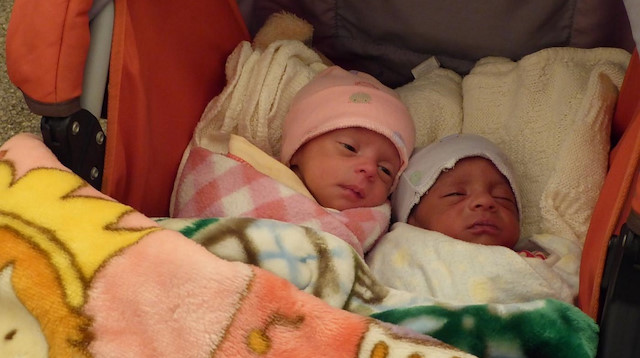
Syrian mothers say Turkey offers proper services for giving birth compared to Syria
Despite ongoing conflict and challenges in their home country, two Syrian mothers living in Turkey's capital of Ankara were able to maintain their family and have children thanks to the country's superb health conditions.
In an interview with Anadolu Agency, Mona Al-Masri, a 45-year-old mother of eight, said she wanted to raise her children and provide them the best conditions in the future by staying in Turkey.
"I feel like I am living with my family in my own country, we get proper care here," said al-Masri, adding: "I pray for the Turkish people everyday."
With help from the opposition Free Syrian Army, al-Masri's family escaped Aleppo in northwestern Syria for the nearby town of Tel Rifaat.
After clashes began, the family managed to make across the border with Turkey to the town of Kilis, where they lived in an apartment for two years.
Al-Masri recounted that her family had moved to a camp in Kilis with the help of their homeowner and host.
"In the camp, we received a house, aid and good services from the charity organizations," she said. "And then the management recommended we leave the camp for our children's future."
Wanting their children to receive a good education in Turkish, the family moved to Ankara last November.
H.I., a 28-year-old mother came to the southern coastal city of Antalya for the first time in 2016 as a fugitive, gave birth to her youngest daughter in a hospital in the city.
When H.I. and her family came to Turkey, her son was two years old and her oldest daughter was only four months.
Pregnant with her fourth child, H.I. said the birth of her third child in Antalya was very easy compared to those of her first two in Syria during the war.
"I suffered during my pregnancy over there due to lack of medications," she said.
"I did not want to have children after my second child in the wartime because the future of my children were unclear but I never thought of an abortion," H.I. said referring to the conditions of war.
Al-Masri, who received her youngest daughters (twins) at the camp in Kilis in 2016 said she suffered a lot throughout her pregnancy because she was in her 40's at that time.
However, she also said that the doctors in the camp had continually done her check-ups and controls.
"If I was to give birth in Syria, it would not have been as comfortable. I am very grateful for the service I received in the camp," she said, noting that two female doctors had helped her while in labor.
"We might not have much relatives but we have our Turkish brothers and sisters here," Al-Masri added.
Though using birth control at the time, al-Masri said that her child was "given by God".
"I also had a miscarriage before my twins, while I was staying in the camp," she added, noting that doctors had said the miscarriage had been due to anemia.
Al-Masri said many Syrians, including pregnant women thought contraceptives were forbidden in the Islamic faith.
"This is why you can find many children in Syria," Al-Masri said, adding: "Because we believe that once we have children, God will help you feed them."
H.I., on the other hand, said she regrets giving birth amid such war conditions in Syria, when she had her oldest daughter in Manbij, with the help of a midwife.
Underlining that she had not intended to have her second child in Manbij during the war, she recalled that she had used contraceptive measures, though these failed to work.
"I do not think birth control is a sin, especially in our circumstances," H.I. said.
Coming from a relatively small family in Syria, H.I. said that they had not been able to travel to Turkey earlier because her husband would be traveling to Lebanon for work and she would take care of her ill father-in-law until he died.
"If the conditions get better and the war comes to an end, I would want to raise my kids in Syria," she added.


